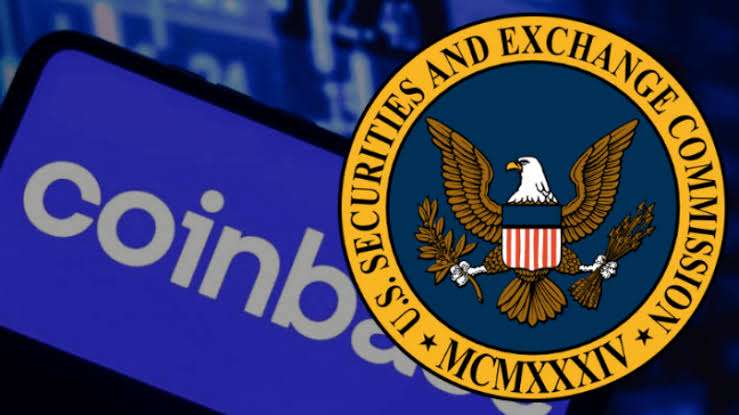
Coinbase vs. SEC: Legal Showdown in Crypto Arena
Coinbase confronts the SEC in a legal battle over alleged securities violations, presenting robust arguments while navigating a judicial dilemma.
Coinbase is prepared to engage in a dispute with the Securities and Exchange Commission regarding the potential violation of U.S. law by its business model.
A four-hour oral argument session is scheduled to be presided over by a federal judge in New York. The hearing outcome will determine whether the judge’s eventual decision to dismiss the SEC’s case will impede or advance the crypto industry’s momentum against the regulator.
Legal Arguments Unveiled: Coinbase Challenges SEC’s Claims
Coinbase is poised to present its case in a federal courtroom, arguing that the legal arguments put forth by the U.S. Securities and Exchange Commission’s (SEC) regarding the crypto exchange’s purported engagement in unregistered securities trading are unfounded.
The potential ramifications of the New York judge’s decision on the broader industry’s disputes with the regulator are significant.
A longshot request, but one that Judge Katherine Polk Failla of the U.S. District Court for the Southern District of New York may take very seriously, has been made by the company to dismiss the case.
On Wednesday, she scheduled four hours of back-and-forth with Coinbase and the SEC—a pervasive oral argument period for a motion of this nature, which in enforcement cases tends to favor the government.
“The government rarely loses on summary judgment motions when it sues individuals,” said Patrick McCarty, a former SEC attorney and financial consultant who instructs crypto classes at Georgetown Law. “However, it is entirely conceivable.”
When she rules on the motion, Judge Failla could significantly shift the balance of power in favor of either party—albeit not this week, but within the following two months at the latest.
Judge Jed Rakoff, who just sided with the SEC in its action against Terraform Labs, or fellow SDNY Judge Analisa Torres, who ruled—also in summary judgment—that the SEC erred in some of its claims regarding XRP being a security in the case against Ripple, will determine her allegiance.
According to the SEC’s interpretation of the Howey test, a fundamental law for identifying securities, a purchaser of a digital asset who has been advised to anticipate a profit is most likely purchasing a crypto security.
However, Coinbase argues that tokens traded on its popular platform do not qualify as securities without a formal obligation, stating that the issuer owes a portion of profits or income to the purchaser.
Judicial Dilemma: Judge Failla Caught Between Legal Precedents
McCarty stated that the case is the initial significant event that “brings into focus this debate regarding whether, in fact, these items are investment contracts or securities transactions under the Howey test.”
According to him, this present petition places Failla in a peculiar predicament, “caught between Judge Torres and Judge Rakoff,” who presides over a substantial portion of the SEC’s caseload in the same court.
McCarty remarked that the two hours each side would have to present its case directly to Failla were excessively lengthy. If the judge remains unconvinced that Coinbase has provided sufficient grounds for an early resolution in favor of the company, the dispute will advance to trial.
Should this occur, the company may pursue SEC internal documents that expose discussions among officials regarding the exchange’s potential suitability for litigation.
In general, the agency and the company disagree not about the situation’s circumstances but about how the law should apply to it.
The determination of Howey’s position “will contribute to the ongoing development of legal precedent,” according to Chris Odinet, a law professor at the University of Iowa College of Law specializing in the study of digital assets.
Odinet stated, “The stakes are exceedingly high because they are intrinsically linked to the business model.” Nevertheless, he maintains that the four-hour scheduled discussion does not serve as an indisputable indication, as he asserts that the matters at hand are exceedingly technical and may necessitate such an extensive amount of inquiry.
Regardless of the outcome of this motion, however, the dispute regarding secondary market cryptocurrency transactions will almost certainly reach the appeals courts.
McCarthy stated, “It’s not as if this will resolve the debate.” “It will simply be another chapter.”
This week’s arguments by Coinbase also follow the SEC’s concession regarding the approval of spot bitcoin exchange-traded funds (ETFs), which agency chair Gary Gensler acknowledged resulted from the SEC’s court loss against Grayscale.
Although that constituted an entirely separate legal matter, a federal court ruled that the regulator’s actions against a cryptocurrency company were “arbitrary and capricious.” Coinbase is prepared to make a comparable claim in this instance.
The judge expressed last year that ether (ETH) is a commodity and not a security, which is at least one significant crypto point on which she has previously disagreed with SEC leaders.
Officials from the SEC once speculated that this might be the case, but they have since clarified that bitcoin (BTC) is the only token unequivocally exempt from SEC regulation.





